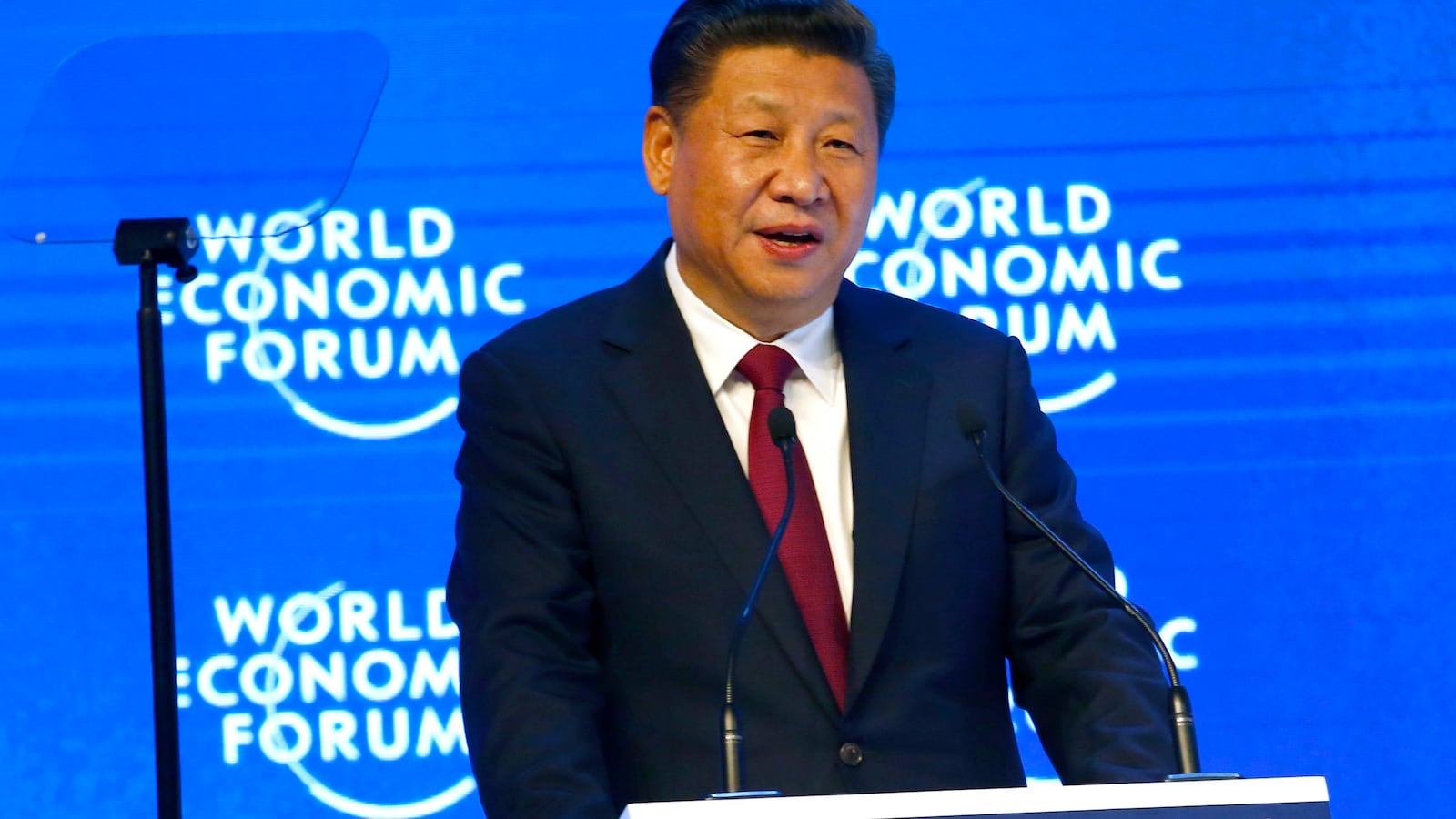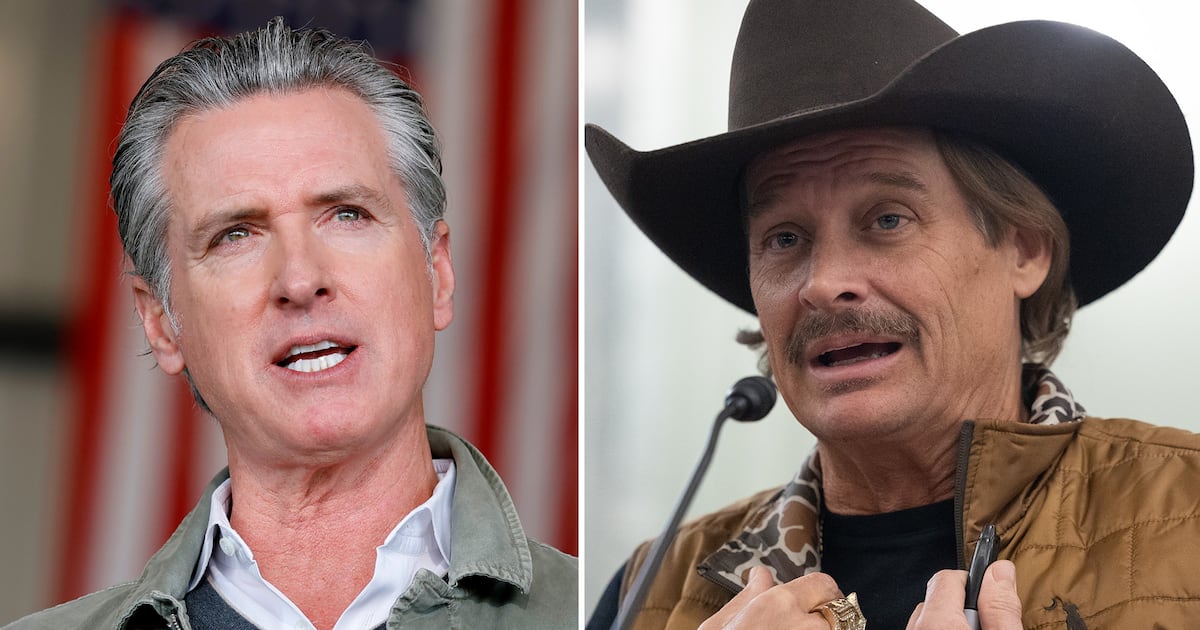PARIS — What a relief! The World Economic Forum in Davos learned today that everything’s going to be okay. President-Elect Donald Trump didn’t really dump all over Europe and its unifying institutions over the weekend, or, well, he did but he didn’t mean it like it sounded: NATO is only kind of “obsolete,” Germany’s Angela Merkel opening the door to migrants was a “catastrophe,” but Trump really respects her a lot. So the high and mighty were told on the Davos stage by his soon-to-be assistant in the White House “office of liaison,” Anthony Scaramucci.
And in case you were worried about a China-United States trade war under the new administration—nah. No less an authority than Chinese Premier Xi Xinping declared himself to be an ardent free-trader, strongly opposed to protectionism, the new incarnation (although he didn’t quite say this) of Davos Man.
Of course, if you believe all that, there are plenty of people with a couple of Alps to sell you.
Related: Davos Man Confronts Trumpocalypse Over Canapés
But however dubious the propositions put forth by the star speakers at Davos on its first full day, the core message—that roles are reversing in a world turned upside down—remained quite clear.
First came Xi Jinping, who is the only Chinese leader ever to attend and address the Forum, which he dubbed (in translation) “a cost-effective brainstorming event.”
In a speech often peppered with awkward analogies, metaphors and citations ranging from Charles Dickens (“the best of times and the worst of times”) to ancient Chinese proverbs, Xi’s core purpose was to defend globalization—and set himself up as the anti-protectionist anti-Trump, without ever naming the president-elect per se.
Xi rejected the idea that globalization was responsible for most of the world’s evils. The waves of refugees from the Middle East and North Africa which have so disturbed the equilibrium of Europe, for instance, are the result of “regional turbulence,” wars and unrest, not globalization, he said.
The international financial crisis, according to Xi, was the result of failed financial regulation, not globalization.
China, too, used to have misgivings about globalization, Xi claimed, but it realized that “to grow its economy, China must have the courage to swim in the vast ocean of the global market.” Protectionism—any attempt to divide up that ocean into “isolated lakes and creeks” is simply impossible, he said.
“Say no to protectionism,” Xi declared. “Pursuing protectionism is just like locking oneself in a dark room. While wind and rain may be kept out, so will light and air. No one will emerge as a winner in a trade war.”
In a context that would hardly seem credible were it not for Trump’s climate-change skepticism, the Chinese premier, who lives and works in the phenomenally polluted city of Beijing, presented himself as a champion of the environment.
The Paris Agreement on efforts to rein in greenhouse gas emissions “is a hard-won achievement,” said Xi. “All signatories should stick to it instead of walking away from it, as this is a responsibility we must assume for future generations.”
The message from Xi and other Chinese officials at Davos was that they did not want to devalue their currency (one of their most potent weapons if a trade war should take place). “China has no intention to boost its competitiveness by devaluing the renminbi,” he said.
He made it sound as if China would play by the rules that the United States under Trump may well be rejecting: “We will open our arms to people of other countries and welcome them aboard the fast train of economic development,” Xi declared. “China will keep its door wide open and not close it,” he said, adding a bit later, “We will level the playing field to make Chinese markets more transparent and better regulated.”
Whew.
A few minutes later, on the same platform, American financier and entrepreneur Anthony Scaramucci presented the Trumpian case as well as he could, given that he didn’t seem sure exactly what the new president is thinking.
One point he made early on: the new administration “[does] not want a trade war.” But since the days of the Marshall Plan in the 1940s, the free trade agreements signed by the United States were meant to enhance stability in various countries around the world by giving them more advantageous terms than the Americans got for themselves. (This would surprise a number of trading partners, of course.)
Over the decades, the need for that kind of deal has diminished, and the result of this “asymmetrical policy,” said Scaramucci, has been a “deleterious effect” on American workers and manufacturers, leading to the backlash against international trade.
By making new and more balanced agreements, Scaramucci suggested, “Paradoxically, President Trump could be one of the last great hopes for globalization.”
Scaramucci made several half-joking references to what he clearly considered a hostile audience, and especially a hostile press. And he was probably right about that.
Trump’s interview with The Times of London and the German paper Bild, published Monday, has provoked outrage on much of the continent. (“Trump Against Europe,” headlined the French daily Le Monde with its logo set in a black banner.)
Scaramucci fell back on anecdotes about what a great guy Trump is when you get to know him: “a super compassionate man” who loves kids and “loves people” and has “all the elements of a great leader.” He extolled Trump’s attention to detail, working not only on his speech, but “on the balls and things like that.” (This is not the kind of remark that normally impresses Davosians.)
The Italian-American financier said Trump in his luxurious tower had a better feel for the working class than he did, even though the people at Trump rallies were “the people I grew up with.”
And Trump had the “genius,” as Scaramucci portrayed him, to take the kind of language you’d use in an intimate setting, say a bar, and put it out on Twitter, thus sharing his true thoughts with the world. “He comes right over the top of the mainstream media,” Scaramucci boasted.
Again, not the kind of thing that wows them on the Magic Mountain.
Like so many of Trump’s explainers, Scaramucci had to put his own spin on those cryptic remarks in an effort to make sense out of something close to nonsense.
So, Trump said NATO is “obsolete”? Well, it dates back to the 1940s, and styles change: “Many people have renovated our homes, we’ve certainly changed our wardrobes since the 1940s," said Scaramucci.
NATO was meant to counter the Soviet threat, but it ought not to be so confrontational, “even if we have some disagreements with the Russians.” (Tell that to the Ukrainians.) And why shouldn’t The Donald tell NATO members to “pay up” if they want protection. After all, “he’s a real estate developer.”
Trump also looks at the North Atlantic Treaty the way an entrepreneur would, according to Scaramucci. He judges what works, what doesn’t work well but can be fixed, and what needs to be thrown out, “shattered” and “disrupted,” according to Scaramucci, who didn’t seem entirely sure which category NATO falls into. “My guess is in category No. 2,” he said.
As for the European Union, it’s a bureaucracy that’s lost touch with the people, and while it was fine for a while preventing wars, Trump understands (it would seem) that the kind of nationalism that led to militarism and tore Europe and the world asunder in the 20th century isn’t really a problem in the 21st. Trump is “very non-militaristic,” said Scaramucci.
Several of the reporters at Davos noted that’s not exactly true of Vladimir Putin, but Scaramucci, like his man Trump, had nothing bad to say about Vlad the Invader.






